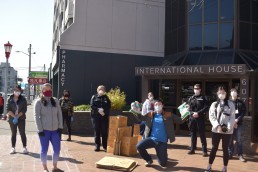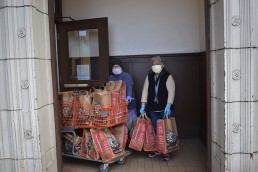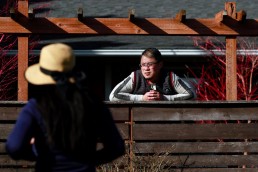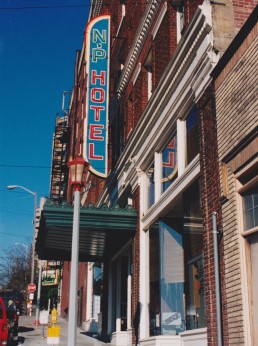Our response to COVID-19
The world has changed, as the crisis continues, we are committed to serve the most vulnerable in our community. We are working hard so low-income people of color, including refugee and immigrant individuals, seniors and families have the latest information on COVID-19. As an organization that works with 13 different language groups, we ensure that our clients understand how to stay safe, why we need to stay at home and not visit elders which for many refugee and immigrant cultures is very difficult. We are determined to emerge from this pandemic, stronger, more resilient and committed to serve our community!
Housing Services and Homelessness Prevention
While staff are not providing in-person services, we are actively working to make sure that clients have access to employment opportunities, food and utility assistance and other financial supports during this health emergency. We are committed to ensuring that our clients at risk for and currently homelessness have access to resources and rapid connections to stable housing. We are committed to continue the vital provision of rental assistance, landlord mediation, and eviction prevention services to help our clients maintain a safe place to call home.
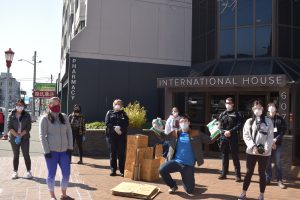
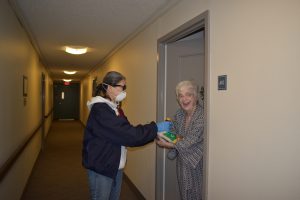
Wilderness Inner-City Leadership Development
Our team is in constant contact with youth and has directed their families to resources as needed as well as delivering groceries. Moving forward, the spring quarter of programming will be remote. While this represents a serious challenge, we believe that continuing the program in any capacity is important to our youth's emotional and intellectual well-being. While the format and platform are still being determined, we are planning on starting our spring quarter in late April or early May.
Set for Success
We want our elders to know that we care! Since March 16, 400 seniors and residents have received groceries. Enduring this pandemic will take a lot more than just food delivery. Emotional support is essential. We stay connected over WeChat or by phone with as many seniors as possible. This way, information is shared over a network of people, and most importantly, help them to feel like they are not alone.
Danny Woo Community Garden
We are focusing on the health and well-being of the elder gardeners and other neighbors in need. We help with grocery delivery and encourage our residents to walk through the Garden. In response to increased food insecurity with the onset of the Covid-19 crisis, we are ramping up our food production to donate to the ACRS Food Bank and neighbors in need. While our Children's Garden program is cancelled, we are providing families with DIY curriculum to explore and enjoy the garden. https://www.dannywoogarden.org/childrens-garden1.html
Employment Navigator
We are providing clients with job search information and helping them with their job applications. We are assisting job seekers with resume building, cover letters, and mock interviews as well as clothing. We are assisting clients in filling out unemployment forms and other resources.
Real Estate Development
To help residents understand King County Public Health guidance for personal safety during Covid-19, ICDA has posted the guidelines in different languages in our 5 buildings. InterIm CDA is not issuing any legal notices to our tenants. They have been given rent, utility, and food assistance as well as information to other resources. Both management companies are working with InterIm to coordinate meal and supply delivery free of charge to residents in need. To support small business in our mixed used buildings, ICDA has issued full rent concessions for April and will evaluate options for May.
InterIm’ s Corner: InterIm Community Development Association assists vulnerable seniors and residents during the Covid-19 crisis
Henry Liu, Eliza Guan and Lizzy Baskerville of InterIm CDA bought groceries at Uwajimaya and delivered them to 18 families and senior residents at the Atlas Apartment, Seattle’s Chinatown-International District. United Filipino club of Seattle University donated food items for today’s grocery bags. The residents will deliver it to the other senior residents and families in the building. This is the third delivery of free groceries, and we will continue to deliver once a week to various families and individuals in need. Since March16,2020 InterIm CDA has delivered 106 free grocery bags. All photos are by Pinky Gupta.
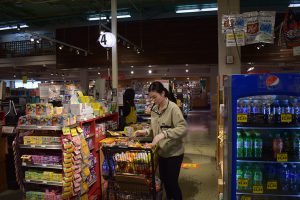
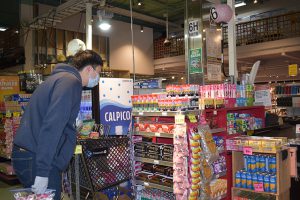
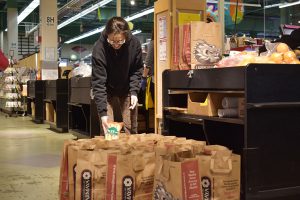
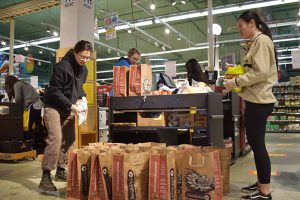
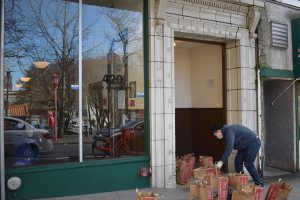
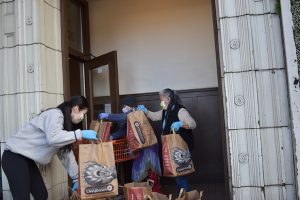
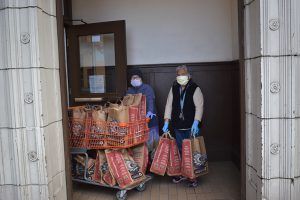
As Seattle-area seniors isolate against coronavirus, they and their families work at staying emotionally strong
One day last week, Genevieve Benjamin took a nap.
Generally, she said, “I don’t nap.” But the 80-year-old retired social worker was tired of watching TV and doing jigsaw puzzles while stuck in her Mount Baker house, away from the particularly acute dangers seniors face from the novel coronavirus.
In the decade since her husband died, she had until recently kept active. Five days a week, she went to the Central Area Senior Center to volunteer, line dance and play bridge. “I just came home to sleep,” she said.
Last week, her big outing was joining her daughter, with whom she lives, to pick up groceries. She stayed in the car.
She cooked a pot of what people from the Caribbean, like her, call okra soup (also known as gumbo) for her brother, a cancer survivor keeping his distance from people outside his household. She left it on his doorstep.
“It’s very, very depressing,” Benjamin said.
It’s a shared societal feeling as public health officials tell us to stay home as much as possible and maintain social distancing. Yet, for seniors, who have suffered the vast majority of fatalities, the warnings are more dire — and the potential ramifications of a constricted life greater.
Many had lost friends and loved ones before COVID-19. Seeing even fewer people could compound the feeling of social isolation, said Dr. Richard Veith, a geriatric psychiatrist and former chair of University of Washington School of Medicine’s Psychiatry and Behavioral Sciences department. Studies show loneliness and depression bring health risks, he said, noting that those who are depressed are five times more likely to die in the months following a heart attack.
Veith, who has a 96-year-old mother in an assisted living facility now closed to visitors, said most of his patients have come to terms with the end of life. “But they don’t want to die alone,” he said. That is literally what is happening to some COVID-19 patients, including one Renton man’s father who died last week without being able to touch his wife or other relatives one last time.
Older people also fear the loss of independence and ability to age gracefully, Veith said. Coronavirus makes matters worse. Those who normally shop for themselves feel they can’t do so safely. Others may have family members bring groceries to them or help in other ways, allowing them to maintain a measure of independence in their homes. But that “precarious balance,” Veith said, could be upended if helpers fall sick or have to quarantine.
At the same time, with age comes perspective. The oldest seniors, after all, lived through World War II.
“They have a remarkable resiliency,” said Dr. Wayne McCormick, head of gerontology and geriatric medicine for UW Medicine. Their attitude: “Hunkering down for a few months? We can do that. We’ve done worse.”
“It’s maybe easier in some ways for people who are retired,” said Debbie Berto, 68, a retired community newspaper publisher who lives on 5 acres in Issaquah. “We’re used to filling our days.”
True, under the self-isolation she and her husband have chosen, she can no longer go to Kiwanis meetings or fundraisers for the Friends of Lake Sammamish State Park. But she occupies herself with books and puzzles. As soon as she recovers from hip surgery, she plans to garden. “It just helps so much that the sun is out,” she said by phone last week. Still, Monday is her husband’s 74th birthday, and it’s shaping up to be a sad one, she said.
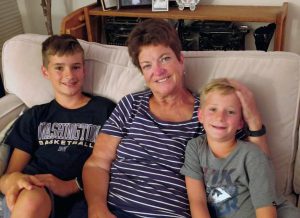
“I have no presents. We had plans to go to a show at the Snoqualmie Casino. Of course, it’s canceled.” She had found a box of cake mix in the cupboard but no frosting. “I’ll figure it out.”
The thing that really hurts is being away from the grandkids, she said. She has six, four of them nearby, ages 9 to 14. She would frequently see them for dinner or watch them play sports. With school called off, she’d like to offer to help look after them, perhaps invite them over to build things in the garage or do yard work for money.
“Instead,” she said, “I’m feeling helpless.”
Family members of seniors want to help them, and sometimes can’t. It can be hard to even say a proper, final goodbye.
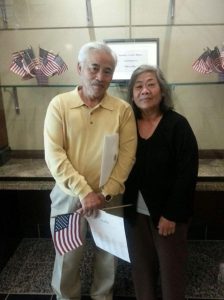
“Cry and say a prayer”
Last Sunday, Vince Viet Nguyen’s said, his feverish father was brought from an Issaquah nursing home to the nearby campus of Swedish Medical Center. The 72-year-old Hoang Nguyen, who previously had a stroke and cancer, tested positive for the coronavirus and was put on a ventilator.
Vince Viet Nguyen, his siblings and his mother were told to say goodbye without walking into the room. They stood on the other side of a glass door. How do you say goodbye in those circumstances? “You don’t,” Nguyen said. “You just look and cry and say a prayer.”
Nguyen’s father hung on for a few days, and the family was able to get an iPad into his room so they could have a video call. Hoang Nguyen died early Friday. Tearing family member’s hearts even more, they couldn’t have a funeral — funerals have been banned along with other gatherings by Gov. Jay Inslee.
While coping with all this, the 37-year-old Vince Viet Nguyen and his husband — a teacher showing coronavirus symptoms — struggled to keep their distance from Nguyen’s mother, who lives in an RV on their Renton property. She has a key to their home so they lock the door to make sure she doesn’t wander in.
Nguyen, who works for a company providing social work care for low-income seniors, is not sure his mom fully grasps the dangers, in part due to language barriers. She understands Vietnamese best, and information about the new virus “rolls out a little slower” in languages besides English, Nguyen observed.
Locking his mom out “feels bad,” Nguyen said. “We call her. What do you need?”
The other day, she said her cellphone wasn’t working. Nguyen told her to leave it on top of a wooden fence that separates her RV from the house. Wearing gloves, he picked up the phone, reset it, cleaned it and put it back on the fence. “Come get your phone,” he yelled.
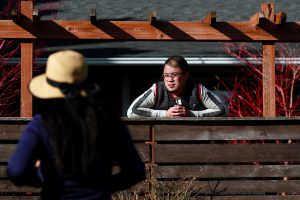
Together, but not as close
Some people are finding creative ways to make older family members feel less alone.
Every day, TJ Williamson brings a stool to the Lake City adult family home where his 87-year-old mother lives. He sits close to her bedroom window and asks staff to bring her there and raise the blinds.
“You look kinda sad, mom,” Williamson, a 57-year-old handyman, told his mother one day last week, talking to her on his cellphone. She was sitting in a darkened room, her image barely visible through the glass. She has dementia, Williams said, and he emphasized why he wasn’t coming inside to play dominoes or taking her to cultural festivals, as usual.
“The virus has killed at least 48 people,” he said that day. “As soon, as soon as I can, we’ll go places.”
Lisa Newton and her two children, Katrina and Karsten Hendrickson, 19 and 22, stood under an umbrella on a rainy day outside the Green Lake neighborhood senior facility where Newton’s parents live. “We have some musical selections for you,” Newton shouted to her parents, both 93 and standing on a balcony.
Karsten, home from graduate school, played from Ravel’s Boléro on the clarinet. Newton, a veterinarian, and her daughter, a college student who has to be especially careful because she suffers from autoimmune diseases, sang music from “Cinderella.” Newton’s dad waved his hands as if conducting.
Newton’s parents both have memory loss and she worries about lack of stimulation, important for cognitive ability. A weekly musical concert, exercise classes, talks — all have been canceled at the facility, she said.
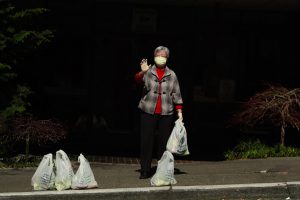
Organizations that work with seniors are trying to devise ways to help. InterIm Community Development Association (InterIm CDA), providing low-income housing and services for immigrant and refugee communities, plans to keep in regular touch with clients through phone calls and the messaging app WeChat.
Many seniors in the Chinatown/International District live on their own, in 400- or 500- square-foot apartments, said executive director Pradeepta Upadhyay.
The organization delivered groceries to about a dozen residents one day last week and wants to pass out informational flyers about the new coronavirus in different languages, Upadhyay said.
Some seniors living in one of InterIm CDA’s apartment buildings, Hirabayashi Place, came up with a way to break the homebound monotony — doing tai chi on the roof patio, keeping a safe distance from each other, according to organization volunteer Susan Ammon, who lives in the building.
“Our seniors are telling us they’re going crazy in their homes. They want to go out,” said Central Area Senior Center Executive Director Dian Ferguson. In consultation with public health officials, the center decided to continue limited activities, including a fitness class capped at 10 people.
“We’re fortunate we have enough space so that we can keep distance between people,” Ferguson said of the multiroom facility, surrounded by trees and overlooking Lake Washington.
“Bottom line, they’re adults,” Ferguson said, discussing whether older people are taking risks in coming. “They still feel like this is America. They have a right to make decisions.”
The oldest, and those with health conditions, are choosing to stay home. It’s the younger seniors who are showing up, she said. Some are just picking up a packed lunch — a service, along with meal deliveries, the center is now expanding after ending sit-down meals.
Friday, Gary Melonson walked across the street from his Central Area home and picked up a turkey sandwich and clam chowder. “It came in quite handy,” said the 67-year-old financial adviser who had open-heart surgery a few years ago. He recently started working from home and, living on his own, doesn’t do much cooking.
He said he was having a hard time with social distancing. “I’m a handshaking, hugging type of person.”
But, despite his job, he was keeping calm about the coronavirus-induced economic meltdown.
It’s distressing for some seniors, according to Veith, the geriatric psychiatrist. They want to be able to leave an inheritance for their children and may worry about being able to stay in their homes.
Melonson said his older clients, though, had weathered other market downturns, including the Great Recession. It may be a while, said the financial adviser, but “this too shall pass.”
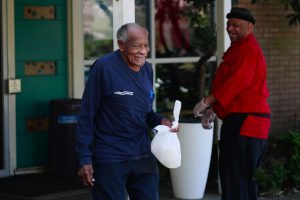
InterIm’s Corner: Celebrating 51 years – InterIm CDA 51st annual gala is on Saturday, April 25, 2020

On Saturday, April 25, 2020, InterIm CDA will commemorate our 51st Anniversary Gala at the Hilton Embassy Suites in Pioneer Square. We are honored to announce that our Keynote Speaker is newly elected King County Councilmember GIRMAY ZAHILAY! Hear about his incredible journey from a refugee to becoming a County Councilmember at the event. He has been a supporter and advocate for immigrant and refugee rights over the years.
Join us as we honor an extraordinary leader in our community with the Bob Santos Leadership in Sustainability Award. We will have a fabulous Live Auction, a delicious Dessert Dash, and DJ Ryan will play tunes and finish the night at our Party on The Perch!
Purchase tickets for $150 by 3/16 for early bird pricing at InterIm CDA’s website, http://interimicda.org/annual-gala/ Prices increase to $175 starting 3/17.
